Unit 1 What's the matter? 单元复习导学案(含答案)
文档属性
| 名称 | Unit 1 What's the matter? 单元复习导学案(含答案) | 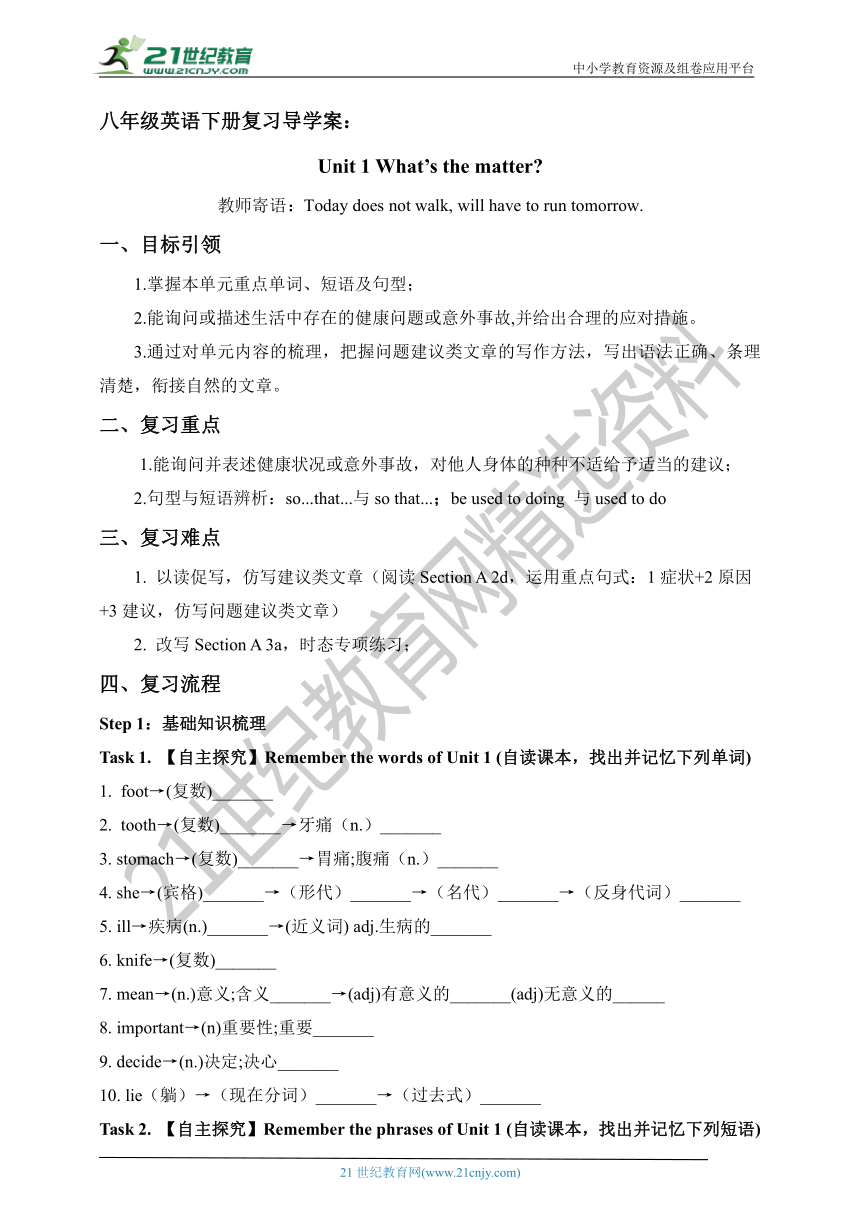 | |
| 格式 | zip | ||
| 文件大小 | 971.5KB | ||
| 资源类型 | 试卷 | ||
| 版本资源 | 人教新目标(Go for it)版 | ||
| 科目 | 英语 | ||
| 更新时间 | 2019-06-27 22:31:53 | ||
图片预览

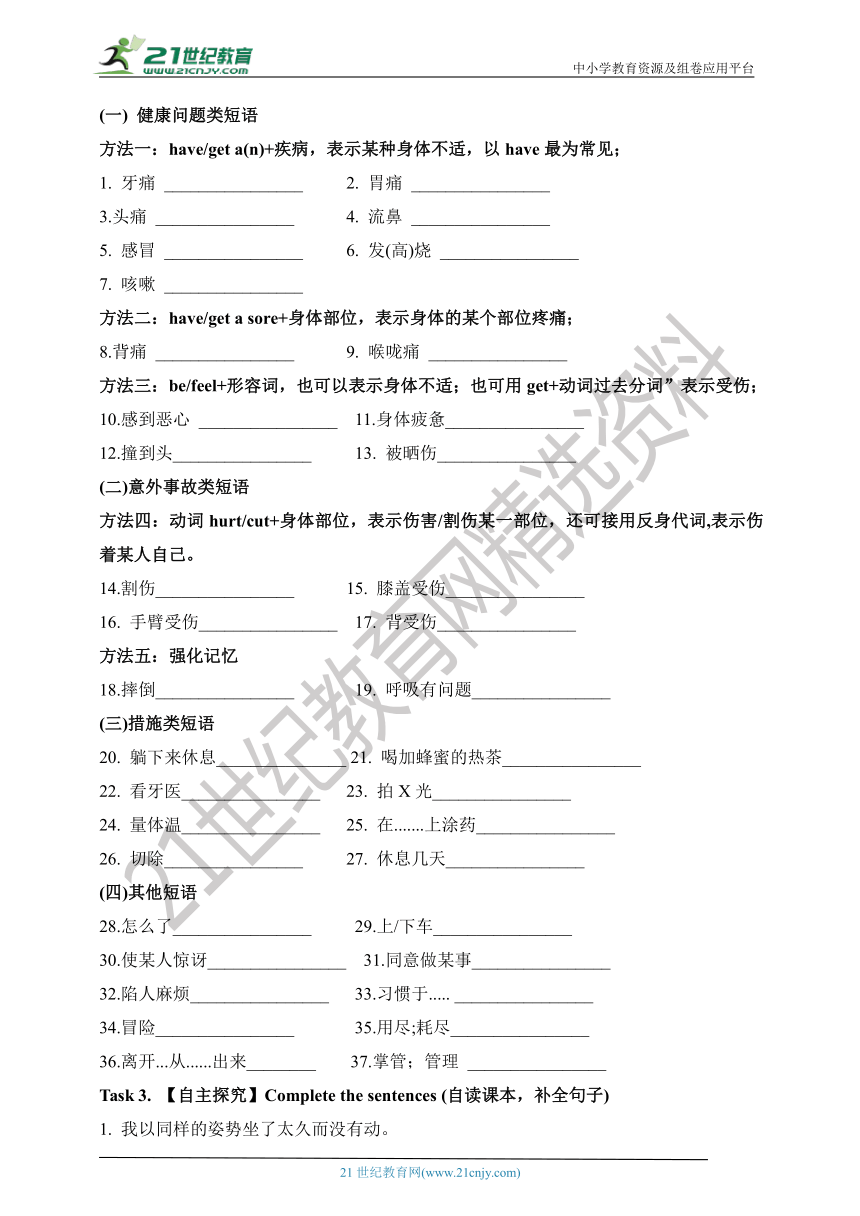
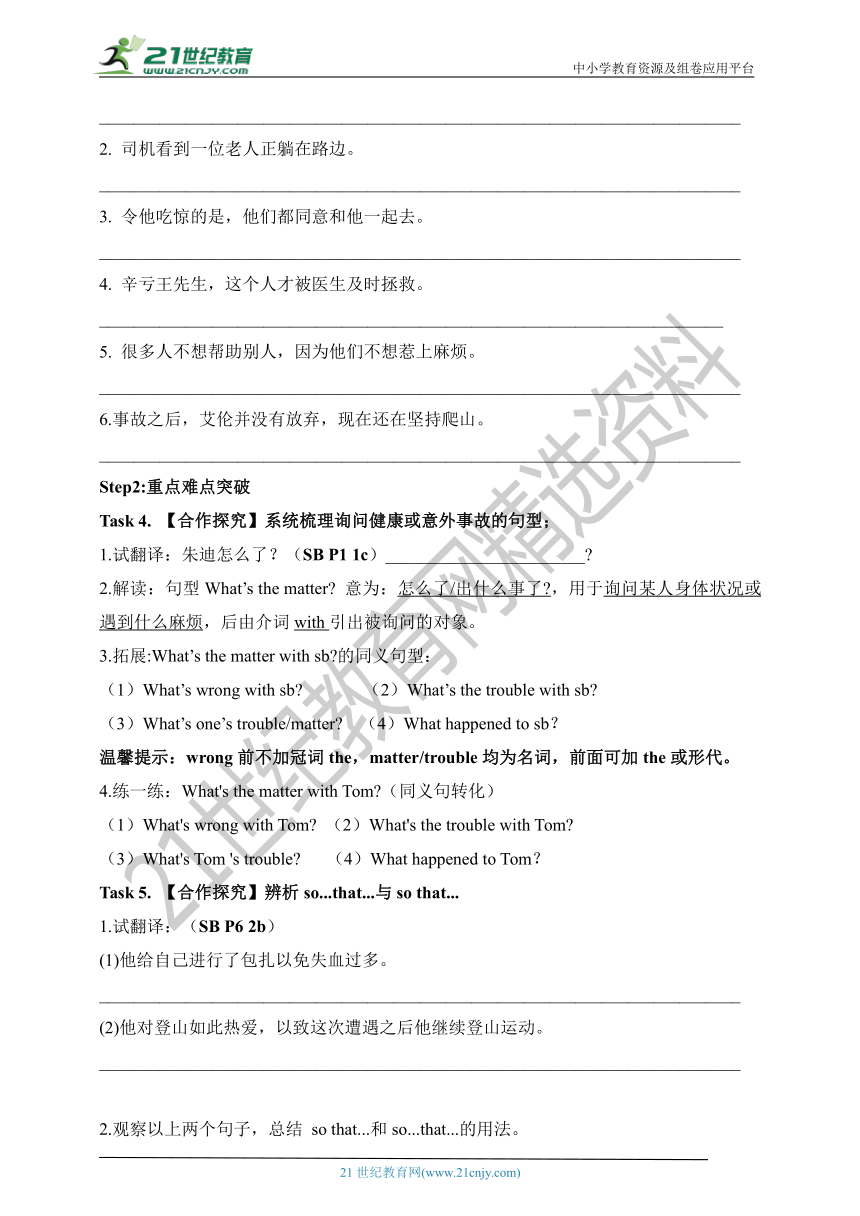
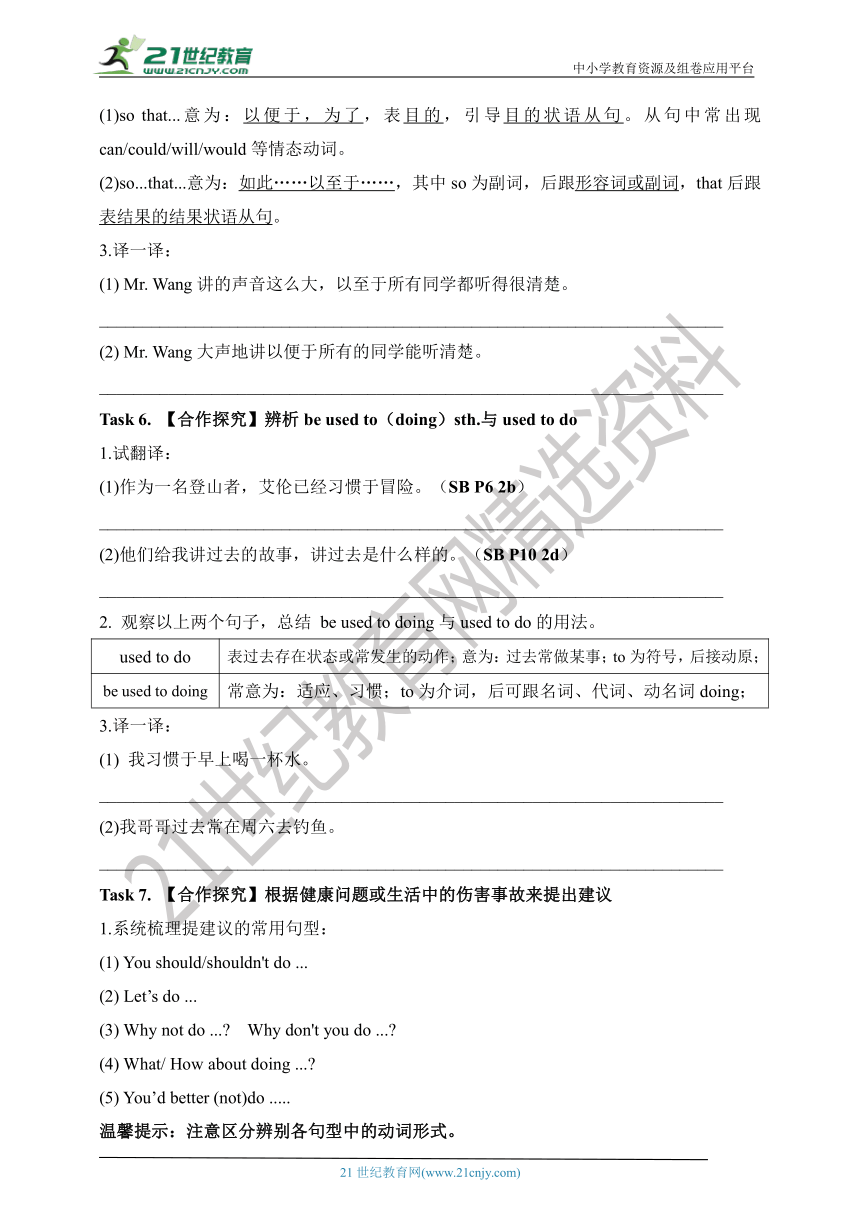
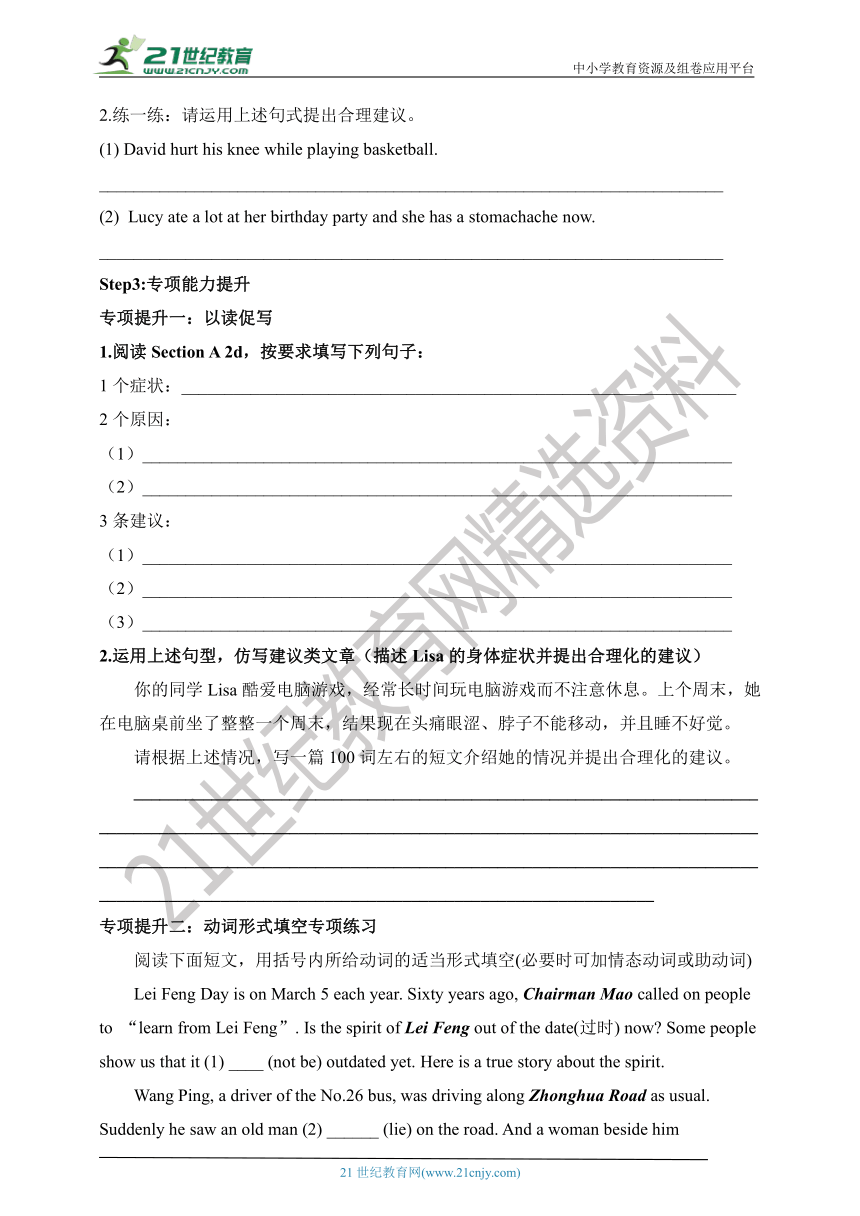
文档简介
中小学教育资源及组卷应用平台
八年级英语下册复习导学案:
Unit 1 What’s the matter?
教师寄语:Today does not walk, will have to run tomorrow.
一、目标引领
1.掌握本单元重点单词、短语及句型;
2.能询问或描述生活中存在的健康问题或意外事故,并给出合理的应对措施。
3.通过对单元内容的梳理,把握问题建议类文章的写作方法,写出语法正确、条理清楚,衔接自然的文章。
二、复习重点
1.能询问并表述健康状况或意外事故,对他人身体的种种不适给予适当的建议;
2.句型与短语辨析:so...that...与so that...;be used to doing 与used to do
三、复习难点
1. 以读促写,仿写建议类文章(阅读Section A 2d,运用重点句式:1症状+2原因+3建议,仿写问题建议类文章)
2. 改写Section A 3a,时态专项练习;
四、复习流程
Step 1:基础知识梳理
Task 1. 【自主探究】Remember the words of Unit 1 (自读课本,找出并记忆下列单词)
foot→(复数)_______
tooth→(复数)_______→牙痛(n.)_______
3. stomach→(复数)_______→胃痛;腹痛(n.)_______
4. she→(宾格)_______→(形代)_______→(名代)_______→(反身代词)_______
5. ill→疾病(n.)_______→(近义词) adj.生病的_______
6. knife→(复数)_______
7. mean→(n.)意义;含义_______→(adj)有意义的_______(adj)无意义的______
8. important→(n)重要性;重要_______
9. decide→(n.)决定;决心_______
10. lie(躺)→(现在分词)_______→(过去式)_______
Task 2. 【自主探究】Remember the phrases of Unit 1 (自读课本,找出并记忆下列短语)
(一) 健康问题类短语
方法一:have/get a(n)+疾病,表示某种身体不适,以have最为常见;
牙痛 ________________ 2. 胃痛 ________________
3.头痛 ________________ 4. 流鼻 ________________
感冒 ________________ 6. 发(高)烧 ________________
7. 咳嗽 ________________
方法二:have/get a sore+身体部位,表示身体的某个部位疼痛;
8.背痛 ________________ 9. 喉咙痛 ________________
方法三:be/feel+形容词,也可以表示身体不适;也可用get+动词过去分词”表示受伤;
10.感到恶心 ________________ 11.身体疲惫________________
12.撞到头________________ 13. 被晒伤________________
(二)意外事故类短语
方法四:动词hurt/cut+身体部位,表示伤害/割伤某一部位,还可接用反身代词,表示伤着某人自己。
14.割伤________________ 15. 膝盖受伤________________
16. 手臂受伤________________ 17. 背受伤________________
方法五:强化记忆
18.摔倒________________ 19. 呼吸有问题________________
(三)措施类短语
20. 躺下来休息_______________ 21. 喝加蜂蜜的热茶________________
22. 看牙医________________ 23. 拍X光________________
24. 量体温________________ 25. 在.......上涂药________________
26. 切除________________ 27. 休息几天________________
(四)其他短语
28.怎么了________________ 29.上/下车________________
30.使某人惊讶________________ 31.同意做某事________________
32.陷人麻烦________________ 33.习惯于..... ________________
34.冒险________________ 35.用尽;耗尽________________
36.离开...从......出来________ 37.掌管;管理 ________________
Task 3. 【自主探究】Complete the sentences (自读课本,补全句子)
1. 我以同样的姿势坐了太久而没有动。
__________________________________________________________________________
2. 司机看到一位老人正躺在路边。
__________________________________________________________________________
3. 令他吃惊的是,他们都同意和他一起去。
__________________________________________________________________________
4. 辛亏王先生,这个人才被医生及时拯救。
________________________________________________________________________
5. 很多人不想帮助别人,因为他们不想惹上麻烦。
__________________________________________________________________________
6.事故之后,艾伦并没有放弃,现在还在坚持爬山。
__________________________________________________________________________
Step2:重点难点突破
Task 4. 【合作探究】系统梳理询问健康或意外事故的句型;
1.试翻译:朱迪怎么了?(SB P1 1c)_______________________?
2.解读:句型What’s the matter? 意为:怎么了/出什么事了?,用于询问某人身体状况或遇到什么麻烦,后由介词with引出被询问的对象。
3.拓展:What’s the matter with sb?的同义句型:
(1)What’s wrong with sb? (2)What’s the trouble with sb?
(3)What’s one’s trouble/matter? (4)What happened to sb?
温馨提示:wrong前不加冠词the,matter/trouble均为名词,前面可加the或形代。
4.练一练:What's the matter with Tom?(同义句转化)
(1)What's wrong with Tom? (2)What's the trouble with Tom?
(3)What's Tom 's trouble? (4)What happened to Tom?
Task 5. 【合作探究】辨析so...that...与so that...
1.试翻译:(SB P6 2b)
(1)他给自己进行了包扎以免失血过多。
__________________________________________________________________________
(2)他对登山如此热爱,以致这次遭遇之后他继续登山运动。
__________________________________________________________________________
2.观察以上两个句子,总结 so that...和so...that...的用法。
(1)so that...意为:以便于,为了,表目的,引导目的状语从句。从句中常出现can/could/will/would等情态动词。
(2)so...that...意为:如此……以至于……,其中so为副词,后跟形容词或副词,that后跟表结果的结果状语从句。
3.译一译:
(1) Mr. Wang讲的声音这么大,以至于所有同学都听得很清楚。
________________________________________________________________________
(2) Mr. Wang大声地讲以便于所有的同学能听清楚。 ________________________________________________________________________
Task 6. 【合作探究】辨析be used to(doing)sth.与used to do
1.试翻译:
(1)作为一名登山者,艾伦已经习惯于冒险。(SB P6 2b)
________________________________________________________________________
(2)他们给我讲过去的故事,讲过去是什么样的。(SB P10 2d)
________________________________________________________________________
观察以上两个句子,总结 be used to doing与used to do的用法。
used to do 表过去存在状态或常发生的动作;意为:过去常做某事;to为符号,后接动原;
be used to doing 常意为:适应、习惯;to为介词,后可跟名词、代词、动名词doing;
3.译一译:
(1) 我习惯于早上喝一杯水。
________________________________________________________________________
(2)我哥哥过去常在周六去钓鱼。
________________________________________________________________________
Task 7. 【合作探究】根据健康问题或生活中的伤害事故来提出建议
1.系统梳理提建议的常用句型:
(1) You should/shouldn't do ...
(2) Let’s do ...
(3) Why not do ...? Why don't you do ...?
(4) What/ How about doing ...?
(5) You’d better (not)do .....
温馨提示:注意区分辨别各句型中的动词形式。
2.练一练:请运用上述句式提出合理建议。
(1) David hurt his knee while playing basketball.
________________________________________________________________________
Lucy ate a lot at her birthday party and she has a stomachache now.
________________________________________________________________________
Step3:专项能力提升
专项提升一:以读促写
1.阅读Section A 2d,按要求填写下列句子:
1个症状:________________________________________________________________
2个原因:
____________________________________________________________________
(2)____________________________________________________________________
3条建议:
____________________________________________________________________
(2)____________________________________________________________________
(3)____________________________________________________________________
2.运用上述句型,仿写建议类文章(描述Lisa的身体症状并提出合理化的建议)
你的同学Lisa酷爱电脑游戏,经常长时间玩电脑游戏而不注意休息。上个周末,她在电脑桌前坐了整整一个周末,结果现在头痛眼涩、脖子不能移动,并且睡不好觉。
请根据上述情况,写一篇100词左右的短文介绍她的情况并提出合理化的建议。
________________________________________________________________________________________________________________________________________________________________________________________________________________________________________________________________________________________________
专项提升二:动词形式填空专项练习
阅读下面短文,用括号内所给动词的适当形式填空(必要时可加情态动词或助动词)
Lei Feng Day is on March 5 each year. Sixty years ago, Chairman Mao called on people to “learn from Lei Feng”. Is the spirit of Lei Feng out of the date(过时) now? Some people show us that it (1) ____ (not be) outdated yet. Here is a true story about the spirit.
Wang Ping, a driver of the No.26 bus, was driving along Zhonghua Road as usual. Suddenly he saw an old man (2) ______ (lie) on the road. And a woman beside him (3)_______ (shout) for help.
He stopped the bus without thinking twice and asked,“What happened to him? ”
“He (4)_______ (have) a serious heart problem and must see a doctor at once.” the woman replied anxiously,“ If we don’t take him to the hospital quickly, he (5) _____ probably _____ (lose) his life.”
“Dear passengers, the man is in great danger and must go to the hospital. (6) _____ (get) off the bus and wait for the next one.”he said to the passengers on the bus.
“Go ahead, young man!”To his surprise, all passengers agreed with him. Some passengers even helped Wang Ping to move the man onto the bus.
Thanks to Wang Ping, the old man (7) _____ (save) in time. The families of the old man were thankful, but Wang Ping left quietly without (8) _____ (say) anything. He was praised highly for his behavior and was called the Finest Driver of China.
In recent years, it is wrongly considered to be old fashion to learn from Lei Feng. Wang Ping saved a stranger whom he didn’t know at all. He sets an example for us Chinese. In fact, some people around us (9) _____ (do) the same things for the society like him. In my opinion, even in modern times, we (10) _____ (help) each other to build a harmonious (和谐的)society and then our country will become better and better.
Step 4:交流成果展示
I looked through my test paper again and again _____ I wouldn’t make any mistakes.
A. because B. so C. so...that... D. so that...
2. Mrs. Liu made a _____(决定) to study abroad last week.
3. After dinner, he used to ____computer games,but now he gets used to _____.
A. play;walk B. playing;walking C. play;walking D. playing;walk
4. They spoke ____ quietly ____I could hardly hear them.
A. such;that B. so;that C. both;and D. either;or
5. 让我惊讶的是,这个小男孩并没有哭。
___________________________________________________________________
6.我最终同意和玛丽去闲逛。
___________________________________________________________________
参考答案
Step 1:基础知识梳理
Task 1. 【自主探究】Remember the words of Unit 1
1.foot→(复数)feet
2.tooth→(复数)teeth→牙痛(n.)toothache
3. stomach→(复数)stomach→胃痛;腹痛(n.)stomachache
4. she→(宾格) her→(形代) her→(名代) hers→(反身代词) herself
5. ill→疾病(n.)illness→(近义词) adj.生病的sick
6. knife→(复数)knives
7. mean→(n.)意义;含义meaning→(adj)有意义的meaningful(adj)无意义的meaningless
8. important→(n)重要性;重要importance
9. decide→(n.)决定;决心decision
10. lie(躺)→(现在分词)lying→(过去式)lay
Task 2. 【自主探究】Remember the phrases of Unit 1
have a toothache 2. have a stomachache 3.have a headache
4. have a nosebleed 5. have a cold 6. have a fever
7. have a cough 8.have a sore back 9. have a sore throat
10.feel sick 11.be tired 12.get hit on the head
13. get sunburned 14.cut oneself 15. hurt one's knee
16. hurt one's arm 17. hurt one's back 18. fall down
19. have problems breathing 20.lie down and rest 21. drink hot tea with honey
22. go to the dentist 23. get an X-ray 24. take one's temperature
25. put some medicine on... 26. cut off 27. rest for a few days
28. what's the matte 29. get on/off 30. to one's surprise
31.agree to do sth. 32..get into trouble 33. be used to doing
34.take a risk 35.run out (of) 36.get out (of) 37.be in control of
Task 3. 【自主探究】Complete the sentences (自读课本,补全句子)
1. I sat in the same way for a long time without moving.
2. The driver saw an old man lying on the side of the road.
3. To his surprise,they all agreed to go with him.
4. Thanks to Mr. Wang,the man was saved ye the doctors in time.
5. Many people don’t want to help others because they don’t want to get into trouble.
6.Aron didn’t give up after the accident and still keeps on climbing mountains.
Task 4. 【合作探究】系统梳理询问健康或意外事故的句型;
1.试翻译:What’s the matter with Judy?
3.拓展:What’s the matter with sb?的同义句型:
(1)What’s wrong with sb? (2)What’s the trouble with sb?
(3)What’s one’s trouble/matter? (4)What happened to sb?
4.练一练:What's the matter with Tom?(同义句转化)
(1)What's wrong with Tom? (2)What's the trouble with Tom?
(3)What's Tom 's trouble? (4)What happened to Tom?
Task 5. 【合作探究】辨析so...that...与so that...
试翻译:
(1)He bandaged himself so that he would not lose too much blood.
(2)His love for mountain climbing is so great that he kept on climbing mountains even after this experience.
3.译一译:
(1)Mr. Wang spoke so loudly that all the students heard him clearly.
(2)Mr. Wang speaks loudly so that all the students can hear him clearly.
Task 6. 【合作探究】辨析be used to(doing)sth.与used to
1.试翻译:
(1)As a mountain climber,Aron is used to taking risks.
(2)They told me the stories and how life used to be.
3.译一译:
(1)I am used to drinking a glass of water in the morning.
(2)My brother used to go fishing on Saturdays.
Task 7. 【合作探究】根据健康问题或生活中的伤害事故来提出建议
2.练一练:请运用上述句式提出合理建议。
(1) He had better go to see a doctor.
(2) She’d better see a doctor and she shouldn’t eat too much next time.
Step3:专项能力提升
专项提升一:以读促写
1.阅读Section A 2d,按要求填写下列句子:参考课本P2 2d
2.参考范文:
Lisa is my classmate and she likes playing computer games a lot. She often sits in front of the computer for too long without moving. Last week,she played computer games for a long time. As a result, she has a headache, sore eyes. Also she can’t move her neck freely. Even worse,she can’t sleep well at night, so she feels tired every day.
In my opinion, she needs to take breaks away from the computer. She should do eye exercises to relax her eyes and go to bed early at night.
I think if she has a good rest, she will feel better soon.
专项提升二:动词形式填空专项练习
答案:1. hasn’t been 2.lying 3.was shouting 4.has 5.will lose
6. Get 7.was saved 8.saying 9.are doing 10.should help
Step 4:交流成果展示
答案:1. D 2.decision 3. C 4.so;that 5.To my surprise,the boy didn’t cry.
6.At last,I agreed to hang out with Mary.
21世纪教育网 www.21cnjy.com 精品试卷·第 2 页 (共 2 页)
21世纪教育网(www.21cnjy.com)
八年级英语下册复习导学案:
Unit 1 What’s the matter?
教师寄语:Today does not walk, will have to run tomorrow.
一、目标引领
1.掌握本单元重点单词、短语及句型;
2.能询问或描述生活中存在的健康问题或意外事故,并给出合理的应对措施。
3.通过对单元内容的梳理,把握问题建议类文章的写作方法,写出语法正确、条理清楚,衔接自然的文章。
二、复习重点
1.能询问并表述健康状况或意外事故,对他人身体的种种不适给予适当的建议;
2.句型与短语辨析:so...that...与so that...;be used to doing 与used to do
三、复习难点
1. 以读促写,仿写建议类文章(阅读Section A 2d,运用重点句式:1症状+2原因+3建议,仿写问题建议类文章)
2. 改写Section A 3a,时态专项练习;
四、复习流程
Step 1:基础知识梳理
Task 1. 【自主探究】Remember the words of Unit 1 (自读课本,找出并记忆下列单词)
foot→(复数)_______
tooth→(复数)_______→牙痛(n.)_______
3. stomach→(复数)_______→胃痛;腹痛(n.)_______
4. she→(宾格)_______→(形代)_______→(名代)_______→(反身代词)_______
5. ill→疾病(n.)_______→(近义词) adj.生病的_______
6. knife→(复数)_______
7. mean→(n.)意义;含义_______→(adj)有意义的_______(adj)无意义的______
8. important→(n)重要性;重要_______
9. decide→(n.)决定;决心_______
10. lie(躺)→(现在分词)_______→(过去式)_______
Task 2. 【自主探究】Remember the phrases of Unit 1 (自读课本,找出并记忆下列短语)
(一) 健康问题类短语
方法一:have/get a(n)+疾病,表示某种身体不适,以have最为常见;
牙痛 ________________ 2. 胃痛 ________________
3.头痛 ________________ 4. 流鼻 ________________
感冒 ________________ 6. 发(高)烧 ________________
7. 咳嗽 ________________
方法二:have/get a sore+身体部位,表示身体的某个部位疼痛;
8.背痛 ________________ 9. 喉咙痛 ________________
方法三:be/feel+形容词,也可以表示身体不适;也可用get+动词过去分词”表示受伤;
10.感到恶心 ________________ 11.身体疲惫________________
12.撞到头________________ 13. 被晒伤________________
(二)意外事故类短语
方法四:动词hurt/cut+身体部位,表示伤害/割伤某一部位,还可接用反身代词,表示伤着某人自己。
14.割伤________________ 15. 膝盖受伤________________
16. 手臂受伤________________ 17. 背受伤________________
方法五:强化记忆
18.摔倒________________ 19. 呼吸有问题________________
(三)措施类短语
20. 躺下来休息_______________ 21. 喝加蜂蜜的热茶________________
22. 看牙医________________ 23. 拍X光________________
24. 量体温________________ 25. 在.......上涂药________________
26. 切除________________ 27. 休息几天________________
(四)其他短语
28.怎么了________________ 29.上/下车________________
30.使某人惊讶________________ 31.同意做某事________________
32.陷人麻烦________________ 33.习惯于..... ________________
34.冒险________________ 35.用尽;耗尽________________
36.离开...从......出来________ 37.掌管;管理 ________________
Task 3. 【自主探究】Complete the sentences (自读课本,补全句子)
1. 我以同样的姿势坐了太久而没有动。
__________________________________________________________________________
2. 司机看到一位老人正躺在路边。
__________________________________________________________________________
3. 令他吃惊的是,他们都同意和他一起去。
__________________________________________________________________________
4. 辛亏王先生,这个人才被医生及时拯救。
________________________________________________________________________
5. 很多人不想帮助别人,因为他们不想惹上麻烦。
__________________________________________________________________________
6.事故之后,艾伦并没有放弃,现在还在坚持爬山。
__________________________________________________________________________
Step2:重点难点突破
Task 4. 【合作探究】系统梳理询问健康或意外事故的句型;
1.试翻译:朱迪怎么了?(SB P1 1c)_______________________?
2.解读:句型What’s the matter? 意为:怎么了/出什么事了?,用于询问某人身体状况或遇到什么麻烦,后由介词with引出被询问的对象。
3.拓展:What’s the matter with sb?的同义句型:
(1)What’s wrong with sb? (2)What’s the trouble with sb?
(3)What’s one’s trouble/matter? (4)What happened to sb?
温馨提示:wrong前不加冠词the,matter/trouble均为名词,前面可加the或形代。
4.练一练:What's the matter with Tom?(同义句转化)
(1)What's wrong with Tom? (2)What's the trouble with Tom?
(3)What's Tom 's trouble? (4)What happened to Tom?
Task 5. 【合作探究】辨析so...that...与so that...
1.试翻译:(SB P6 2b)
(1)他给自己进行了包扎以免失血过多。
__________________________________________________________________________
(2)他对登山如此热爱,以致这次遭遇之后他继续登山运动。
__________________________________________________________________________
2.观察以上两个句子,总结 so that...和so...that...的用法。
(1)so that...意为:以便于,为了,表目的,引导目的状语从句。从句中常出现can/could/will/would等情态动词。
(2)so...that...意为:如此……以至于……,其中so为副词,后跟形容词或副词,that后跟表结果的结果状语从句。
3.译一译:
(1) Mr. Wang讲的声音这么大,以至于所有同学都听得很清楚。
________________________________________________________________________
(2) Mr. Wang大声地讲以便于所有的同学能听清楚。 ________________________________________________________________________
Task 6. 【合作探究】辨析be used to(doing)sth.与used to do
1.试翻译:
(1)作为一名登山者,艾伦已经习惯于冒险。(SB P6 2b)
________________________________________________________________________
(2)他们给我讲过去的故事,讲过去是什么样的。(SB P10 2d)
________________________________________________________________________
观察以上两个句子,总结 be used to doing与used to do的用法。
used to do 表过去存在状态或常发生的动作;意为:过去常做某事;to为符号,后接动原;
be used to doing 常意为:适应、习惯;to为介词,后可跟名词、代词、动名词doing;
3.译一译:
(1) 我习惯于早上喝一杯水。
________________________________________________________________________
(2)我哥哥过去常在周六去钓鱼。
________________________________________________________________________
Task 7. 【合作探究】根据健康问题或生活中的伤害事故来提出建议
1.系统梳理提建议的常用句型:
(1) You should/shouldn't do ...
(2) Let’s do ...
(3) Why not do ...? Why don't you do ...?
(4) What/ How about doing ...?
(5) You’d better (not)do .....
温馨提示:注意区分辨别各句型中的动词形式。
2.练一练:请运用上述句式提出合理建议。
(1) David hurt his knee while playing basketball.
________________________________________________________________________
Lucy ate a lot at her birthday party and she has a stomachache now.
________________________________________________________________________
Step3:专项能力提升
专项提升一:以读促写
1.阅读Section A 2d,按要求填写下列句子:
1个症状:________________________________________________________________
2个原因:
____________________________________________________________________
(2)____________________________________________________________________
3条建议:
____________________________________________________________________
(2)____________________________________________________________________
(3)____________________________________________________________________
2.运用上述句型,仿写建议类文章(描述Lisa的身体症状并提出合理化的建议)
你的同学Lisa酷爱电脑游戏,经常长时间玩电脑游戏而不注意休息。上个周末,她在电脑桌前坐了整整一个周末,结果现在头痛眼涩、脖子不能移动,并且睡不好觉。
请根据上述情况,写一篇100词左右的短文介绍她的情况并提出合理化的建议。
________________________________________________________________________________________________________________________________________________________________________________________________________________________________________________________________________________________________
专项提升二:动词形式填空专项练习
阅读下面短文,用括号内所给动词的适当形式填空(必要时可加情态动词或助动词)
Lei Feng Day is on March 5 each year. Sixty years ago, Chairman Mao called on people to “learn from Lei Feng”. Is the spirit of Lei Feng out of the date(过时) now? Some people show us that it (1) ____ (not be) outdated yet. Here is a true story about the spirit.
Wang Ping, a driver of the No.26 bus, was driving along Zhonghua Road as usual. Suddenly he saw an old man (2) ______ (lie) on the road. And a woman beside him (3)_______ (shout) for help.
He stopped the bus without thinking twice and asked,“What happened to him? ”
“He (4)_______ (have) a serious heart problem and must see a doctor at once.” the woman replied anxiously,“ If we don’t take him to the hospital quickly, he (5) _____ probably _____ (lose) his life.”
“Dear passengers, the man is in great danger and must go to the hospital. (6) _____ (get) off the bus and wait for the next one.”he said to the passengers on the bus.
“Go ahead, young man!”To his surprise, all passengers agreed with him. Some passengers even helped Wang Ping to move the man onto the bus.
Thanks to Wang Ping, the old man (7) _____ (save) in time. The families of the old man were thankful, but Wang Ping left quietly without (8) _____ (say) anything. He was praised highly for his behavior and was called the Finest Driver of China.
In recent years, it is wrongly considered to be old fashion to learn from Lei Feng. Wang Ping saved a stranger whom he didn’t know at all. He sets an example for us Chinese. In fact, some people around us (9) _____ (do) the same things for the society like him. In my opinion, even in modern times, we (10) _____ (help) each other to build a harmonious (和谐的)society and then our country will become better and better.
Step 4:交流成果展示
I looked through my test paper again and again _____ I wouldn’t make any mistakes.
A. because B. so C. so...that... D. so that...
2. Mrs. Liu made a _____(决定) to study abroad last week.
3. After dinner, he used to ____computer games,but now he gets used to _____.
A. play;walk B. playing;walking C. play;walking D. playing;walk
4. They spoke ____ quietly ____I could hardly hear them.
A. such;that B. so;that C. both;and D. either;or
5. 让我惊讶的是,这个小男孩并没有哭。
___________________________________________________________________
6.我最终同意和玛丽去闲逛。
___________________________________________________________________
参考答案
Step 1:基础知识梳理
Task 1. 【自主探究】Remember the words of Unit 1
1.foot→(复数)feet
2.tooth→(复数)teeth→牙痛(n.)toothache
3. stomach→(复数)stomach→胃痛;腹痛(n.)stomachache
4. she→(宾格) her→(形代) her→(名代) hers→(反身代词) herself
5. ill→疾病(n.)illness→(近义词) adj.生病的sick
6. knife→(复数)knives
7. mean→(n.)意义;含义meaning→(adj)有意义的meaningful(adj)无意义的meaningless
8. important→(n)重要性;重要importance
9. decide→(n.)决定;决心decision
10. lie(躺)→(现在分词)lying→(过去式)lay
Task 2. 【自主探究】Remember the phrases of Unit 1
have a toothache 2. have a stomachache 3.have a headache
4. have a nosebleed 5. have a cold 6. have a fever
7. have a cough 8.have a sore back 9. have a sore throat
10.feel sick 11.be tired 12.get hit on the head
13. get sunburned 14.cut oneself 15. hurt one's knee
16. hurt one's arm 17. hurt one's back 18. fall down
19. have problems breathing 20.lie down and rest 21. drink hot tea with honey
22. go to the dentist 23. get an X-ray 24. take one's temperature
25. put some medicine on... 26. cut off 27. rest for a few days
28. what's the matte 29. get on/off 30. to one's surprise
31.agree to do sth. 32..get into trouble 33. be used to doing
34.take a risk 35.run out (of) 36.get out (of) 37.be in control of
Task 3. 【自主探究】Complete the sentences (自读课本,补全句子)
1. I sat in the same way for a long time without moving.
2. The driver saw an old man lying on the side of the road.
3. To his surprise,they all agreed to go with him.
4. Thanks to Mr. Wang,the man was saved ye the doctors in time.
5. Many people don’t want to help others because they don’t want to get into trouble.
6.Aron didn’t give up after the accident and still keeps on climbing mountains.
Task 4. 【合作探究】系统梳理询问健康或意外事故的句型;
1.试翻译:What’s the matter with Judy?
3.拓展:What’s the matter with sb?的同义句型:
(1)What’s wrong with sb? (2)What’s the trouble with sb?
(3)What’s one’s trouble/matter? (4)What happened to sb?
4.练一练:What's the matter with Tom?(同义句转化)
(1)What's wrong with Tom? (2)What's the trouble with Tom?
(3)What's Tom 's trouble? (4)What happened to Tom?
Task 5. 【合作探究】辨析so...that...与so that...
试翻译:
(1)He bandaged himself so that he would not lose too much blood.
(2)His love for mountain climbing is so great that he kept on climbing mountains even after this experience.
3.译一译:
(1)Mr. Wang spoke so loudly that all the students heard him clearly.
(2)Mr. Wang speaks loudly so that all the students can hear him clearly.
Task 6. 【合作探究】辨析be used to(doing)sth.与used to
1.试翻译:
(1)As a mountain climber,Aron is used to taking risks.
(2)They told me the stories and how life used to be.
3.译一译:
(1)I am used to drinking a glass of water in the morning.
(2)My brother used to go fishing on Saturdays.
Task 7. 【合作探究】根据健康问题或生活中的伤害事故来提出建议
2.练一练:请运用上述句式提出合理建议。
(1) He had better go to see a doctor.
(2) She’d better see a doctor and she shouldn’t eat too much next time.
Step3:专项能力提升
专项提升一:以读促写
1.阅读Section A 2d,按要求填写下列句子:参考课本P2 2d
2.参考范文:
Lisa is my classmate and she likes playing computer games a lot. She often sits in front of the computer for too long without moving. Last week,she played computer games for a long time. As a result, she has a headache, sore eyes. Also she can’t move her neck freely. Even worse,she can’t sleep well at night, so she feels tired every day.
In my opinion, she needs to take breaks away from the computer. She should do eye exercises to relax her eyes and go to bed early at night.
I think if she has a good rest, she will feel better soon.
专项提升二:动词形式填空专项练习
答案:1. hasn’t been 2.lying 3.was shouting 4.has 5.will lose
6. Get 7.was saved 8.saying 9.are doing 10.should help
Step 4:交流成果展示
答案:1. D 2.decision 3. C 4.so;that 5.To my surprise,the boy didn’t cry.
6.At last,I agreed to hang out with Mary.
21世纪教育网 www.21cnjy.com 精品试卷·第 2 页 (共 2 页)
21世纪教育网(www.21cnjy.com)
同课章节目录
- Unit 1 What's the matter?
- Section A
- Section B
- Unit 2 I'll help to clean up the city parks.
- Section A
- Section B
- Unit 3 Could you please clean your room?
- Section A
- Section B
- Unit 4 Why don't you talk to your parents?
- Section A
- Section B
- Unit 5 What were you doing when the rainstorm came
- Section A
- Section B
- Review of Units 1-5
- Unit 6 An old man tried to move the mountains.
- Section A
- Section B
- Unit 7 What's the highest mountain in the world?
- Section A
- Section B
- Unit 8 Have you read Treasure Island yet?
- Section A
- Section B
- Unit 9 Have you ever been to a museum?
- Section A
- Section B
- Unit 10 I've had this bike for three years.
- Section A
- Section B
